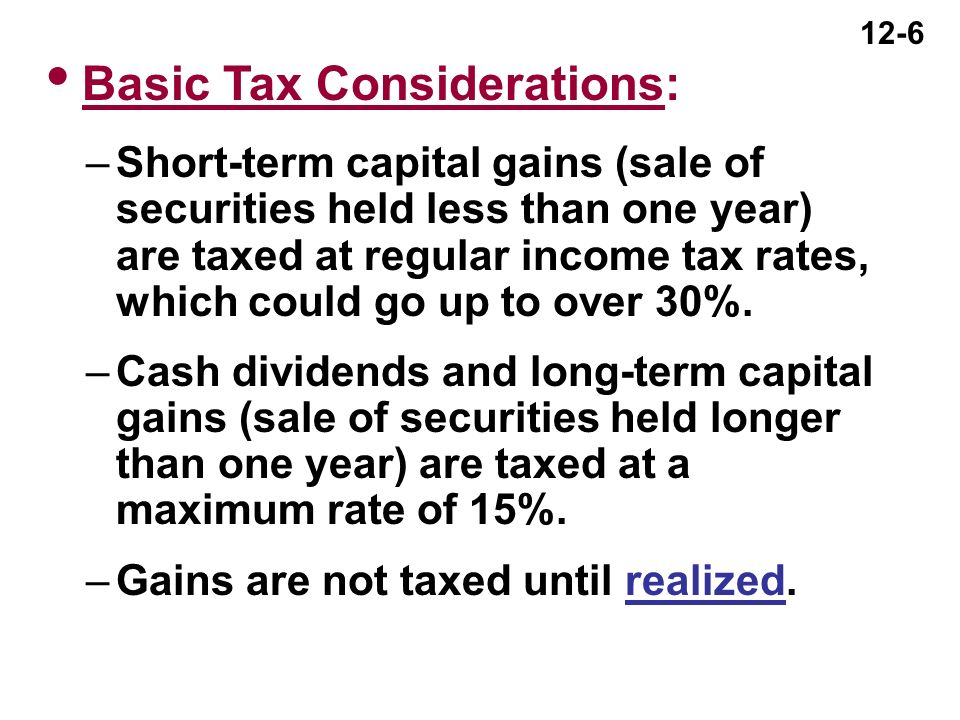Sale of inherited stock long or short term
Gains or losses on stock investments are normally long-term if you own the shares for more than one year. If you owned the stock for one year or less, gains and losses are short-term. Inherited stock might seem to pose a problem because the deceased owner made the investment on one date and you inherited the shares on another date.
Fortunately, the Internal Revenue Service has a very simple solution. Any capital gain or loss that is the result of selling inherited stock is always long-term. This rule applies regardless of how long you or the original owner owned the shares.
Taxes on Investments Received as a Gift or Inheritance
You are not responsible for taxes on any gain that occurred while the original owner was alive. However, you cannot use any capital loss on the shares that occurred prior to the date of death as a tax deduction.

Ambiguities regarding the amount of capital gain or loss on inherited stock are resolved by adjusting the cost basis of the original investment. If the stock has fallen in value, the cost basis is stepped down to the fair market value on the date of death. Your gain or loss then depends on changes in the stock price that occur after the death of the original owner.
Are Inherited Stocks Long-Term or Short Term Capital Gains? | Personal Finance
To calculate the capital gain on the sale of inherited stock, subtract the adjusted cost basis from the proceeds of the stock sale. To figure out your tax liability, multiply the gain by the applicable long-term capital gains rate. As of the maximum long-term capital gains tax rate was 15 percent.
Business Studies - Sources of Finance: Business Exam TipsIf you ended up with a capital loss instead of a gain, there is no tax liability. A special alternative valuation rule applies when an estate is large enough to be subject to federal estate taxes.
If a stock has fallen in value since the date of death, the executor of the estate has the option of using the stock price six months after the date of death as the cost basis.
The reduced basis means that the value of the stock for estate tax purposes is smaller, thus reducing the estate tax. Based in Atlanta, Georgia, W D Adkins has been writing professionally since He writes about business, personal finance and careers. Adkins holds master's degrees in history and sociology from Georgia State University.
He became a member of the Society of Professional Journalists in Each week, Zack's e-newsletter will address topics such as retirement, savings, loans, mortgages, tax and investment strategies, and more.
At the center of everything we do is a strong commitment to independent research and sharing its profitable discoveries with investors. This dedication to giving investors a trading advantage led to the creation of our proven Zacks Rank stock-rating system. These returns cover a period from and were examined and attested by Baker Tilly, an independent accounting firm. Visit performance for information about the performance numbers displayed above.
Skip to main content. Are Inherited Stocks Long-Term or Short-Term Capital Gains? More Articles When Does Inherited Stock Become Taxable?
.png)
How to Pay Capital Gains Selling Inherited Stock How to Calculate Capital Gains for Decedent Stocks Taxes on Stocks After a Death How to Sell an Inherited Mutual Fund Taxes on Inherited Trusts. Inherited Shares Any capital gain or loss that is the result of selling inherited stock is always long-term.
Net Deals
Gains Ambiguities regarding the amount of capital gain or loss on inherited stock are resolved by adjusting the cost basis of the original investment. Figuring Taxes To calculate the capital gain on the sale of inherited stock, subtract the adjusted cost basis from the proceeds of the stock sale.
Alternative Valuation A special alternative valuation rule applies when an estate is large enough to be subject to federal estate taxes. I Inherited It TurboTax: Tracking Your Tax Basis Internal Revenue Service: About the Author Based in Atlanta, Georgia, W D Adkins has been writing professionally since Recommended Articles Long-Term Vs.
To determine long or short term capital gains o - Q&A - Avvo
Short-Term Capital Loss Deduction Long-term vs. Related Articles How to Enter Short-Term Capital Gains Are Stock Warrants Long-Term Capital Gains? Can Long-Term Capital Loss Offset Short Term Capital Gains for Tax Purposes? Short-Term Capital Gains in Real Estate "What Does ""Long Term Capital Loss"" on Schedule D Mean? Money Sense E-newsletter Each week, Zack's e-newsletter will address topics such as retirement, savings, loans, mortgages, tax and investment strategies, and more.
Editor's Picks Dividends Vs. Long-Term Capital Gains How to Determine Capital Loss From Stocks in the Short-Term Vs.

Long-Term Carry Forward What Are the Benefits of Long-Term Capital Gains? Short Term Bond Vs. Long-Term Bond Rates How to Determine a Long-Term Tax Gain. Trending Topics Latest Most Popular More Commentary.
Quick Links Services Account Types Premium Services Zacks Rank Research Personal Finance Commentary Education. Resources Help About Zacks Disclosure Privacy Policy Performance Site Map. Client Support Contact Us Share Feedback Media Careers Affiliate Advertise. Follow Us Facebook Twitter Linkedin RSS You Tube. Zacks Research is Reported On: Logos for Yahoo, MSN, MarketWatch, Nasdaq, Forbes, Investors. Logo BBB Better Business Bureau.
NYSE and AMEX data is at least 20 minutes delayed. NASDAQ data is at least 15 minutes delayed.